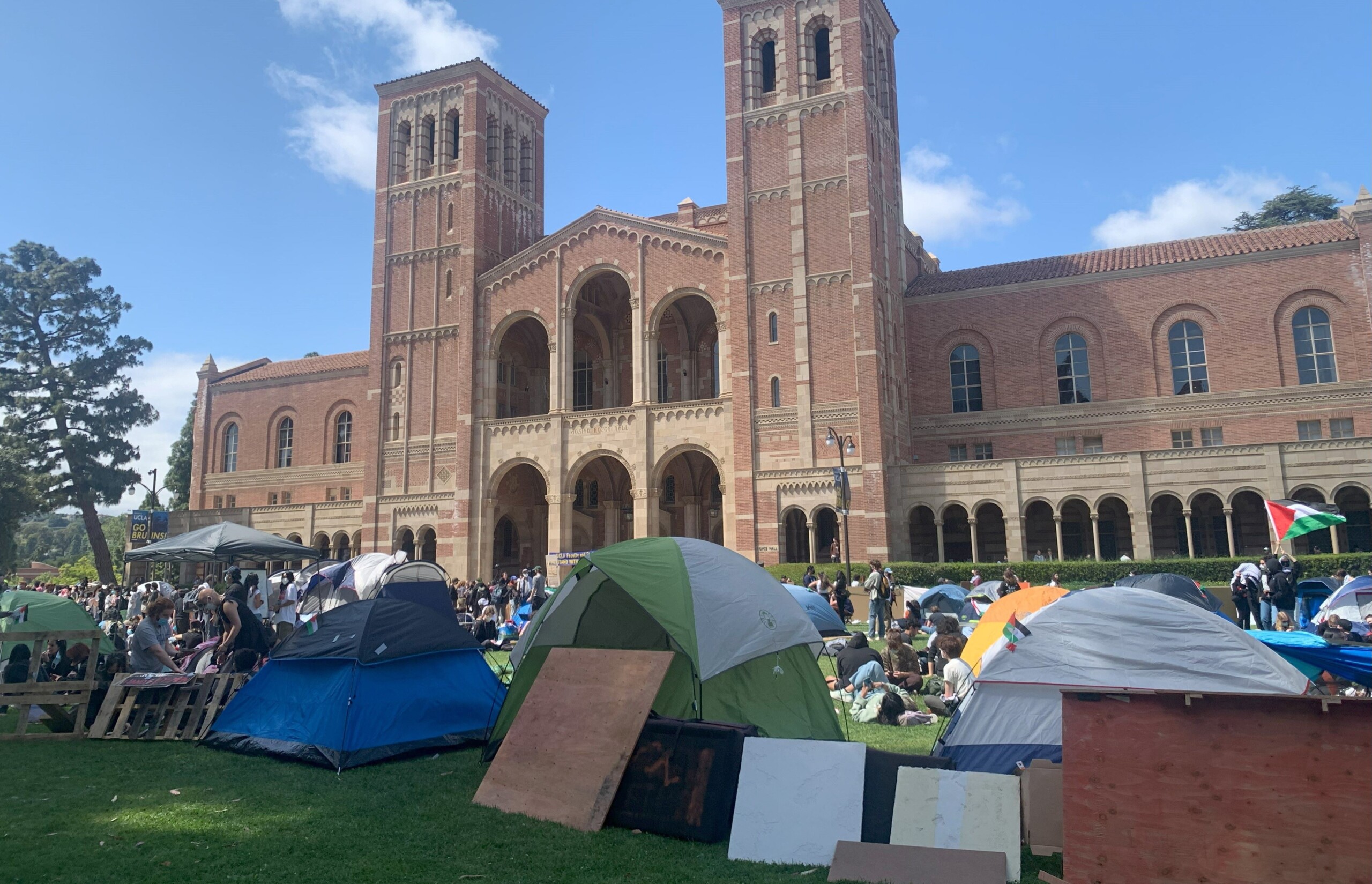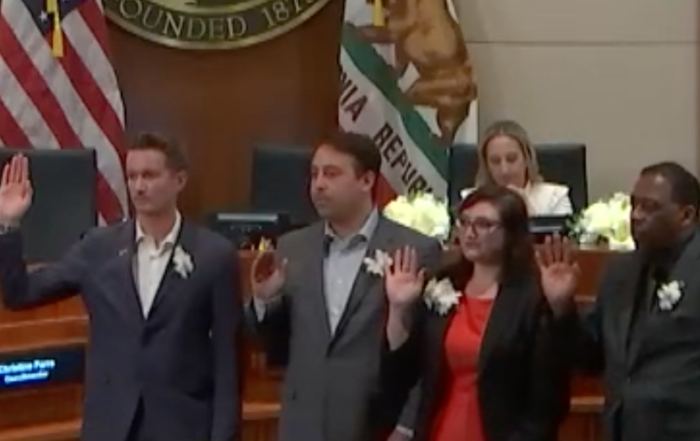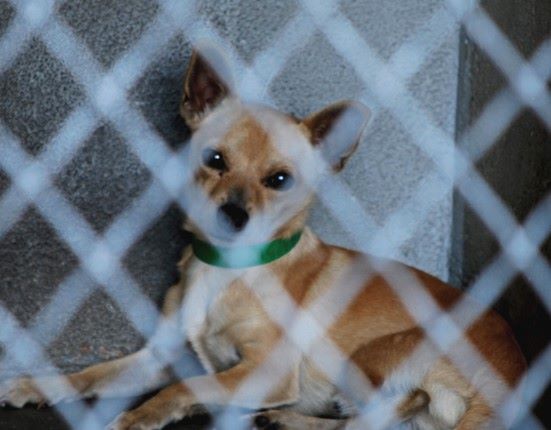Early Thursday morning, students erected tents at the University of California, Los Angeles (UCLA) in solidarity with the Palestinian people. By early afternoon, the encampment on Royce Quad was full of tents and surrounded by a barrier wall made of pallets and plywood. Students lounged on blankets, led chants, and readied themselves for a protracted protest – chief among their demands was UC’s divestment from military and weapons manufacturers, profiteers of war and, students say, the ongoing destruction of Gaza by the Israeli Defense Forces (IDF).
The encampment at UCLA is one of many college protests springing up across the country. UCLA was well prepared to join in the student movement. The campus has a long history of student protest, and the coalitions that came together yesterday have a wealth of experience to draw from. Just last month, student groups Divest UCLA and Students for Justice in Palestine UCLA (SJP), among others, erected what they dubbed Tent City during a UC Board of Regents Meeting. Tent City stayed up for three days, as long as it took to effectively disrupt the Regents investment meetings and get certain agenda items tabled.
One especially contentious agenda item, J1, would restrict the use of political speech on UC websites and social media platforms. Critics of the bill called it “rushed and breathtakingly broad,” noting it went against UC’s Academic Freedoms Committee recommendations. Some UC Faculty balked at the ambiguity of the proposal, fearing that its interpretation would massively restrict all public speech and make faculty members targets for increased harassment within the university and from outside actors. UC Regent Hadi Makarechian noted that the policy was introduced due to concerns about pro-Palestine speech. Regent Jay Sures initially argued that the bill was written clearly, but it has since been edited to address more widespread concerns. The Regents say the bill is intended to address hate speech and clarify UC policy.
Students have long battled with the Regents and UCLA administration for a say in UC policies and investments. In the last decade, student associations from UCLA to UC Berkeley have passed war divestment resolutions, but UC’s $169 Billion investment portfolio remains enmeshed with BlackRock, an asset manager with significant investments in Lockheed Martin, Northrop Grumman, and Raytheon.
In addition to ignoring or outright opposing student divestment resolutions, student organizers say there has been a pattern of silencing pro-Palestinian voices. Vincent Doehr, a UCLA organizer with Graduate Students for Justice in Palestine, told Westside Voice that students have been subjected to harassment, doxing, and police violence. The attempted restrictions on student organizing are reflected in the university’s careful navigation of discussing the war. The administration “Has not recognized that 34,000 Palestinians have been killed by Israel,” said Doehr, a silence students consider unconscionable. “But I think that’s what motivates people to still show out like this,” he continued, gesturing to the hundreds of students on the quad. “It’s a strong moral conviction that they don’t want their tuition money or their tax money going towards the killing of Palestinians.”
Doehr noted that the coalitions were focused on divestment from all companies profiting from war, not just Israeli institutions and corporations. The coalition was also composed of groups that supported UC divestment from fossil fuels and real estate behemoths. Students say UC’s funding should be invested in the students and workers, many of whom are struggling to pay their tuition and afford housing.
The atmosphere around the encampment was positive for most of the day – some onlookers were curious, while others were there specifically to support the students’ right to protest. Inside the encampment, students set up a people’s library and an art station among the rows of tents. By mid-afternoon, students chanting for divestment were accompanied by the music of trumpets, accordions, and snare drums. In the early evening, the UCLA Jewish Voices for Peace (JVP) chapter led a Passover Seder in the group’s center.
While college administrators across the country have called in local and state police on their encampments, resulting in hundreds of arrests and countless injuries to students and professors, a police presence was notably absent from UCLA.
On the other side of town, USC students faced their own campus police and later the LAPD. 93 USC students were arrested on Wednesday after a day’s worth of organizing on their campus. Trojans for Palestine, an organizer of the protest, had scheduled a day of speakers, art activities, a Kaddish reading from their JVP chapter, and a film screening. Their plans were quickly upended by the near-immediate deployment of campus police, who appeared to have forcefully removed student tents and knelt on the neck of a student after throwing them to the ground. Later that day, LAPD officers arrived in riot gear and threatened protestors with rubber bullets before arresting a small group of students who remained on the Alumni Park lawn. After sunset, an LAPD officer reportedly shot a student with a rubber bullet after pushing the remaining protesters off of USC grounds.
When asked about the potential for a similar police response at UCLA, Doehr said the students were unafraid. “I think that’s why so many people are here,” he said. “I don’t think that they’re thinking that the possibility of police violence is the worst thing that can happen. I think they’re more worried about what they see happening in Palestine.”
Faculty from UCLA were also present in solidarity with the students. Michael Chwe, a Professor of Political Science at UCLA, told Westside Voice “We’re here to protect the students’ right to protest and also protect their welfare.”
Graeme Blair, an Associate Professor of Political Science, said, “I want to make sure that UCLA administration and the Regents of the University of California understand that faculty and staff here support the right of students to express dissent on campus and that we hold this as one of the central important elements of maintaining open discourse in an academic community.”
Both Professors cited the violent responses to student encampments at Columbia, USC, and the University of Texas at Austin and expressed concern about UC administrators following suit against their students. Professor Blair said “The University of California overall has a history in the last 15 years of repressing protests of various kinds. They have maced protesters at the Davis campus during peaceful protests and they’ve exacted academic punishments and housing related punishments on graduate students who were striking a couple of years ago at Santa Cruz.” Professor Blair said faculty was worried about UC repeating these tactics on the student protesters at UCLA.
Professor Chwe advocated for the right to free speech, citing its importance for social change and its significance in UC’s history: “Many very important political movements have started here at the University of California. This is something we should support and we should prize and treasure.”
UCLA’s administration seems to agree with the professors on that point. UCLA did not respond to a request for comment but released a statement yesterday saying “Our top priority is always the safety and wellbeing of our entire Bruin community. We’re actively monitoring this situation to support a peaceful campus environment that respects our community’s right to free expression while minimizing disruption to our teaching and learning mission.” As of this afternoon, they have not issued a dispersal order to the students.
Student encampments across the country have been accused of antisemitism, a claim roundly rejected by organizers who argue a clear distinction between anti-zionism and antisemitism. Organizers with Divest UCLA and other coalition groups have been subject to inaccurate portrayals of their protests — claims debunked by the UCLA newsroom itself. Student groups say these allegations endanger their members, making them vulnerable to harassment and physical violence.
Yesterday, the students managed to keep the encampment secure. The encampment will remain, students say until their demands are met. They don’t know when that will happen, but they’re committed to keeping the pressure on the administrators. “People are seeing with very clear eyes the injustices around them,” said Doehr. “I think there will always be people here who care.”
Photo by the author.
Stay informed. Sign up for The Westside Voice Newsletter
By clicking submit, you agree to share your email address with Westside Voice. We do not sell or share your information with anyone.








